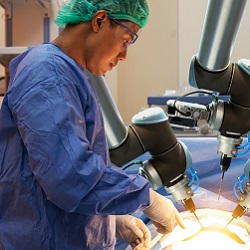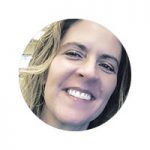 For this month’s career feature, we interviewed Oliver Amft who authored “How Wearable Computing Is Shaping Digital Health” in the January-March 2018 issue of IEEE Pervasive Computing. Amft is the founding director of the Chair of eHealth and mHealth at the Friedrich Alexander University Erlangen-Nuremberg (FAU), where, since 2017, he has been full professor. Amft coordinated European research consortia such as GreenerBuildings and iCareNet, and is a principal investigator for several other European and national projects. He has co-authored more than 150 refereed archival research publications in the fields of context recognition, biomedical sensor technology, wearable computing, digital health, and embedded systems. We asked Amft about careers in healthcare technology.
For this month’s career feature, we interviewed Oliver Amft who authored “How Wearable Computing Is Shaping Digital Health” in the January-March 2018 issue of IEEE Pervasive Computing. Amft is the founding director of the Chair of eHealth and mHealth at the Friedrich Alexander University Erlangen-Nuremberg (FAU), where, since 2017, he has been full professor. Amft coordinated European research consortia such as GreenerBuildings and iCareNet, and is a principal investigator for several other European and national projects. He has co-authored more than 150 refereed archival research publications in the fields of context recognition, biomedical sensor technology, wearable computing, digital health, and embedded systems. We asked Amft about careers in healthcare technology.
Computing Now: What types of tech advances in the field of healthcare technology will see the most growth in the next several years?
Amft: I believe there will be two key areas: (1) Novel methods for system design and analysis building/expanding into an area of computational manufacturing, and (2) Data mining algorithms that dynamically personalize or adapt according to acquired context information. My group and I are working on both areas as they provide synergies for wearable and implantable medical technology. Our vision is to develop methodologies that optimize systems—from materials to software—fitting personal health needs: to prevent the worsening of disease, recovery, or maintenance of health.
Computing Now: What advice would you give college students to give them an advantage over the competition?
Amft: The general recommendation that I give every student is to explore and develop their interests, which hopefully results in motivation and enthusiasm for developing novel healthcare/medical technology. There are many areas that require progress and experts in the next decades. We currently see a convergence between material science, mechanical, electrical and computer engineering, as well as computer science. My specific suggestion is to get involved in interdisciplinary teams to learn from each other and learn about your own capacity. It starts with finding a common team language and often leads to innovation along with a lot of fun. Universities often offer project-based courses that are an excellent start—a startup on the side with a group of similarly motivated people can do it too. If unsure where or how to connect, talk to your professors. I often advise and support students outside of the curricula.
Computing Now: If a graduate must begin work as an intern, freelancer, or independent contractor in the field of healthcare technology, what are some tips for building a strong portfolio for presentation in possible future interviews?
Amft: You should see it as an opportunity. As an intern you get to see different fields, connect with experts with different backgrounds, and build a network. Mind you: it is not who you know, but those with whom you have collaborated. In health technology, your achievements in interdisciplinary teams will matter. It shows that you have mastered the field and broken barriers between the classic silos. Try to set your goals and work with/learn from the experts around you.
Computing Now: Name one critical mistake for young graduates to avoid when starting their careers?
Amft: I often see students with excellent marks in advanced subjects of their curricula. Some of them then fail to succeed in projects, which require they connect knowledge across domains, or they fail to identify complementing specialists to help in progressing quickly. Projects in health technology are usually interdisciplinary. Practicing in problem-based learning settings can help them overcome those challenges.
Computing Now: Do you have any learning experiences you could share that could benefit those just starting out in their careers?
Amft: As a young graduate, I got exposed to industrial embedded systems development, requiring all (and more) of my skills back then. Choosing these challenges and mastering them motivated me to probe further and grow competencies beyond a single field of study. Today, I aim to inspire students similarly in seminars and scientific projects at my lab.

About Lori Cameron
ComputingEdge’s Lori Cameron interviewed Amft for this article. Contact her at l.cameron@computer.org if you would like to contribute to a future computing careers article. Contact Amft at amft@computer.org.